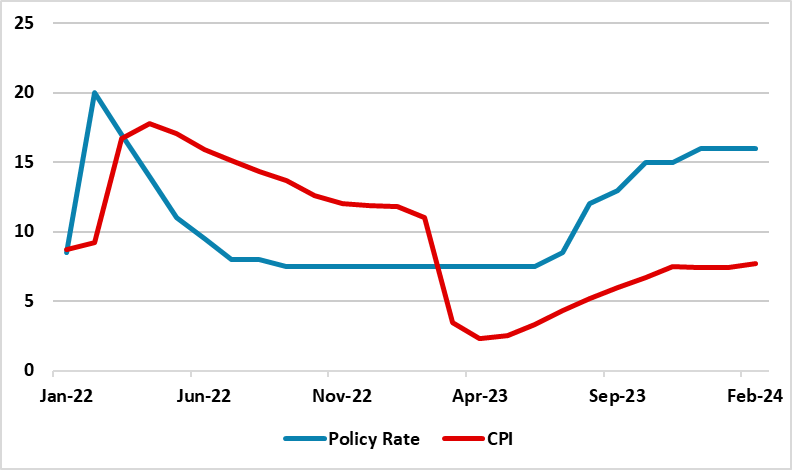Russia’s Inflation Remained High at 7.7% in February
Bottom Line: After remaining unchanged at 7.4% YoY in January and December, we saw an uptick in the inflation hitting 7.7% in February. We think stubborn price pressures continue to be strong due to high military spending, currency weakening, tight labour market, high salaries and benefits, and invigorating consumer demand.
Figure 1: CPI (YoY, % Change) and Policy Rate (%), January 2022 – February 2024

Source: Continuum Economics
According to Rosstat figures on March 13, prices of food, non-food products and services rose by 8.1%, 6.6% and 8.4% on an annual basis in February, respectively. The consumer price index (CPI) shot up by 0.7% on a monthly basis. We think the inflationary pressures continued to remain sticky basically due high military spending, lagged feedthrough of the weak Ruble (RUB) and tight labor market. (Note: On the currency front, after RUB weakened by around 20% against the dollar in 2023 alone, the currency lost 1.5% of its value against the USD in February).
February’s 7.7% YoY inflation remained far above the Central Bank of Russia’s (CBR) 2024 forecast range of 4% - 4.5%, and CBR’s medium term target of 4%, which is worrisome for Russian economy. Analysts polled by the CBR in March revised upward their forecast for 2024 inflation to 5.2%, up 0.3 pp against the poll in February.
According to a bulletin published by the CBR’s research and forecasts department, annual inflation may continue growing in case price growth rates remain high until the middle of 2024 due to the base effects. Central Bank analysts stated that the inflation pressure remains currently high, particularly in stable components of the consumer price index evolution. Achieving 4% - 4.5% inflation target in 2024 will require keeping tough monetary conditions during a long period of time, the department noted.
In line with this, we do not expect any rate cuts in Q2, and we foresee that CBR will likely consider cutting rates in Q3, if the inflation allows. (Note: We think the 6-month ban on gasoline exports from March 1 would likely help maintaining fuel prices down in Russia, and this may help relieve the inflationary pressures).
Speaking about the course of inflation, president Putin appeared expectant and applauded the actions by the government and the CBR as key rate hikes lead to a slight slowdown in lending in Russia, Putin indicated.
In order to fight against the inflation, CBR increased policy rate to 16% on December 15 citing inflationary pressures remaining high, triggered by strong demand and lending. CBR decided to hold the kay rate constant at 16% in Q1. We expect CBR will leave the policy rate unchanged at 16% on MPC scheduled at March 22 despite the recent increasing trend in the inflation.
Taking into account CBR’s determination in hiking the key rates, we predict this can suppress demand and imports and squeeze lending particularly in 2H of 2024, but only gradually with lagged effects. Despite CBR’s actions, we feel cooling off inflation will not be straightforward as it is likely that the inflation would remain higher than CBR’s expectations particularly in 1H of 2024, partly due to base effects, and high military spending.
We do not expect the recent uptick in the inflation or worsening macroeconomic outlook would affect the outcome of the presidential elections on March 17 as Putin remains the strongest candidate according to various polls, and we think Putin would win the elections by a huge margin this Sunday.